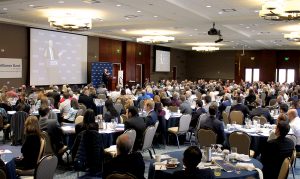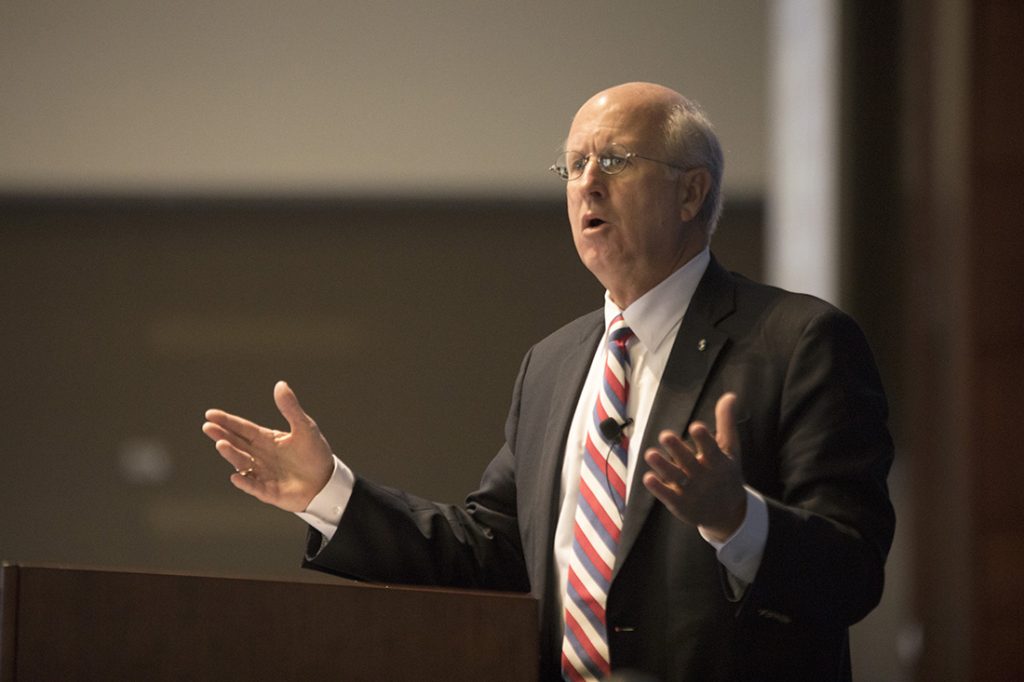By Heidi Toth
NAU Communications
David Walker, a former comptroller general and head of the U.S. Government Accountability Office, highlighted the need for government to be more responsible and accountable in how it adds to the growing deficit during his speech at Northern Arizona University’s 42nd Economic Outlook Conference.
“We are living based upon the past rather than preparing for a better future,” Walker told hundreds of attendees at the High Country Conference Center Thursday morning.
Walker, now a senior strategic adviser for the global public sector practice at PricewaterhouseCoopers, was the keynote speaker at the event, which is sponsored by the Alliance Bank Business Outreach Center, a collaboration between the W. A. Franke College of Business and Alliance Bank of Arizona. NAU President Rita Cheng welcomed attendees to the conference, focusing on highlights from its 41 years of existence, including the inaugural economic forecast that tourism would “lead the way for a growing Flagstaff economy.”
She talked about how economic activity would affect students as they earn degrees and begin their careers and the commitment NAU has made to not only provide graduates with an education that will prepare them for work in their chosen industries but also to improve those industries through research and development.
“For 42 years, NAU has hosted this event not just to lead in the analysis of economic factors, but also in the development of new potential within those factors,” she said. “We have generated new possibilities in many areas of Arizona’s economy—both in fields of long-term importance to our state, like astronomy and forest health, and in new industries like cybersecurity and health care.”
Walker, who served in the federal government under Presidents Ronald Reagan, George H.W. Bush and Bill Clinton, highlighted the relative financial position of the state of Arizona and the city of Flagstaff, comparing them to his home of Bridgeport, Connecticut, which is struggling in large part because of underfunded public pensions and unfunded retiree health care. However, he repeatedly pointed out much of what state and local governments can do are affected by what the federal government is doing, which needs to change.

His biggest point of concern is not the total debt, which has quadrupled since the year 2000, but the public debt as a percentage of the economy. After the Revolutionary War, that number was about 35 percent. After World War II, that ratio was 105 percent—the highest it’s been, Walker said, though the United States took on that debt with good reason. Today that ratio is close to 80 percent without taking into account what’s owed to Social Security and Medicare.
The U.S. economy also is a smaller percentage of the global economy than it used to be and the ratio of people working to retired people has shrunk from 16:1 to 3.1:1. There is no way to grow enough to overcome this deficit, nor is there a way to cut enough, Walker said. It will be a combination of those actions and smarter governance across the board that gets the United States to a reasonable 60 percent debt-to-economy ratio.
For that to happen in the coming years, he said, the U.S. needs strong presidential leadership, bipartisan work in Congress, an overhaul of health care, taxes and the public school system and greater accountability amongst officials to ensure a representative and responsive republic.
“The biggest deficit in this country is not a budget deficit, it’s a leadership deficit,” he said.



